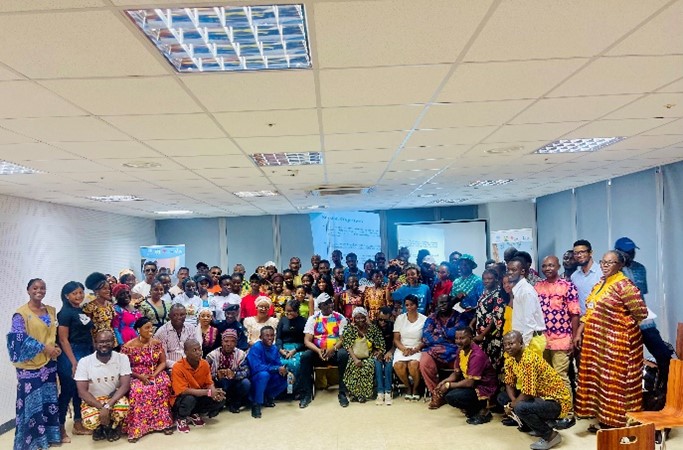By Foday Moriba Conteh
As part of their aims towards enhancing participants’ knowledge and skills regarding civic rights and responsibilities, conflict mitigation, and the promotion of social cohesion, Caritas Freetown, in collaboration with Catholic Relief Services (CRS) and funded by the United Nations Peace Building Funds (UNPBF) has on Friday 2nd February, 2024 concluded a one-day regional dialogue session on Peace and Social Cohesion. The dialogue, which brought together various stakeholders, including political party structures, traditional and religious leaders, women’s groups, youth groups, and organizations representing persons with disabilities (PWD) in the Western Area was held at the Freetown City Hall on Wallace Johnson Street in Freetown.
In her address, Eliza Sillah, Project Coordinator for Caritas Freetown’s Youth in Politics and Peace Building Project, emphasized that the dialogue aimed to create a structured platform for youths, women, diverse stakeholders, and groups to engage in constructive discussions on civic rights, responsibilities, conflict mitigation and social cohesion.
She added that the event also focused on enhancing participants’ knowledge and skills in these areas and developing an inclusive community action plan to address civic rights, social conflicts, and gender-based violence.
“The project, named, “Youth in Politics and Peacebuilding,” is funded by the United Nations Peace Building Fund and spans 24 months. It targets youth aged 18-24, women, and persons with disabilities in specific communities across the Western Area Rural and Urban districts,” she revealed.
She said that Caritas Sierra Leone, including its local offices, are key implementing partners for the initiative, adding that the project’s goal is to foster social cohesion and dialogue, with outcomes focusing on enhanced youth participation, conflict mitigation, and diversified livelihoods.
She revealed that the project employs various approaches, including training youth groups as peer educators on peacebuilding methods, safeguarding training, vocational training, and mentorship programs. Furthermore, she stated that it aims to empower young women through livelihood support, civic education, leadership skills training, and multi-sectoral stakeholders’ engagement.
She concluded by disclosing that the project’s holistic approach aims to contribute to positive social change and promote the meaningful involvement of young people in decision-making processes.
Rev. Dr. Usman Jesse Fornah, the General Secretary of the Inter-Religious Council Sierra Leone, highlighted the visible regional divisions within the country. The analysis indicated elevated political tensions marked by disputed election results, political polarization, perceived injustice, violence, unrest, and a lack of trust in state institutions and Civil Society Organizations.
He said that the identified conflicts have the potential to undermine good governance, security, development, political stability, and tarnish the country’s international reputation, adding that the challenges in conflict prevention and management encompass the abuse of social media, regional political divides, the sincerity of political actors regarding peace and national cohesion, public mistrust of Government institutions and civil society organizations, and socio-economic conditions such as unemployment, corruption, and a high cost of living.
Rev. Dr. Fornah urged the workshop participants to devise tangible solutions that can be shared with the Independent Commission for Peace and National Cohesion and the IRCSL for nationwide social mobilization and information dissemination. In a direct message to young people, he emphasized their crucial role in shaping the future and urged them to work diligently to prevent all forms of conflicts, contributing to a safer and more harmonious society.
Representing the All-People’s Congress, Dr. Richard Konteh emphasized the significance of empowering the youth to lead Sierra Leone towards prosperity and unity. He urged the youth not to be passive followers but active leaders, emphasizing the responsibility to build a better Sierra Leone for future generations.
Dr. Konteh highlighted the need to address root causes of conflicts, particularly injustice, and called on institutions like the police, judiciary, and parliament to play a role in ensuring justice prevails.
He stressed the importance of youth taking leadership roles in fostering peace, reaching out to neighbours, and promoting unity across party lines.
Dr. Konteh also addressed recent incidents of violence and arson, urging a swift response to maintain stability. He expressed the APC’s commitment to the ongoing dialogue process to address issues related to elections and strengthen the democratic foundation of Sierra Leone.
Bilkissu Jallon, Assistant Research Officer, Office of National Security, expressed gratitude to Caritas Freetown and CRS for their coordination and collaboration in addressing national security concerns, highlighting ONS’s mission to coordinate national security efforts for sustainable development, poverty reduction and conflict prevention.
While noting Sierra Leone’s overall peaceful situation, she drew attention to recent security threats and emphasized the need for collective efforts in combating challenges.
She reiterated ONS’s commitment to women and youth inclusion, recognizing them as crucial actors in conflict resolution and drug addiction prevention. She called for strengthened collaboration and coordination across the country to define and distinguish national security efforts.
Jallon concluded by underlining ONS’s commitment to conducting oversight, ensuring compliance with the law and working with other institutions to look at suspected security matters.
She urged citizens to utilize ONS’s intelligence-gathering capabilities to collect information that safeguards lives.
Jallon emphasized that the conduct and management of national security operations are collective responsibilities, urging citizens to fight against drugs abuse, misuse of social media, and support compliance with state security measures for peace and cohesion.
Statement from speakers was followed by Group discussions among participants on roles and responsibilities of different stakeholders in conflict prevention and management, challenges and opportunities for collaboration and coordination among stakeholders.
A plenary session was then held to share the main findings and recommendations from the group discussions and identification of priority areas and actions for an inclusive community action plan on conflict prevention and management.




